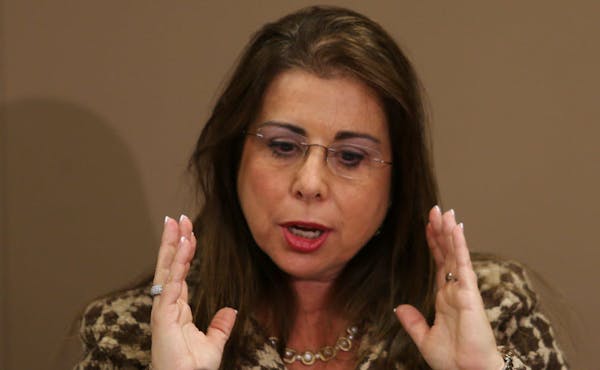Sick teachers are being forced to drag themselves to school when a substitute cannot be found. Principals are pressed into classroom duty when a teacher is absent. Students are split up and stuffed into other classrooms when a teacher is out.
Across the state, school administrators are grappling with a growing shortage of substitutes, making it increasingly difficult for classroom teachers to call in sick, squeeze in necessary training or slip away for an emergency. The shortage looms as districts around the state face the added strain of a nasty flu season that has further depleted teacher ranks.
"It's a crisis," said Bernadette Burnham, a teacher in Duluth. "It's another layer of stress for everybody."
Minnesota administrators are deep in what is emerging as a larger problem nationally. With a surging economy and low unemployment rates, more substitutes are finding permanent work as teachers or in other fields. And more teachers are leaving the field midcareer, shrinking the potential pool of retired teachers who often fill the role of substitutes.
Administrators have tried to combat the problem by boosting salaries for substitutes, but they are finding only mixed success. This school year, Minneapolis has 516 substitutes available in its pool, down from 579 a year ago.
Teachers at Bethune Elementary in north Minneapolis just assume there will be no substitutes to take over their classroom when they call in sick.
"I tell my students that they may have a sub or they might have to go into another teacher's classroom," said Gina Ostrowski, a teacher at Bethune.
The life of a substitute teacher can be grueling. They often are notified at the last minute what school to report to, and live with almost constant uncertainty about where — or even if — they will be working the next day. Then they must dive into unfamiliar lesson plans with students who bring a host of challenges and special learning needs. Substitutes endure all this for lower pay than average teachers.
"Daily substitute teachers are often paid low wages, have no job security, or even predictability from day-to-day, and no benefits," said Rob Gardner, a teacher at Edina High School. "No one can make a living with these realities, and as the economy improves, there are many more sustainable positions for people. Being a sub just can't compete with that."
The average daily rate for a short-term substitute teacher varies around the state, but in the metro area districts typically pay $110 to $125 a day. Rural districts generally pay less.
The strong demand has made reliable substitute teachers a prized commodity who can pick and choose which schools they will work at and which ones they won't.
Conner Simms, a substitute teacher in Minneapolis, says he often finds himself in a prized position. The administrators and teachers are "overwhelmingly appreciative" when he shows up for the day.
"They really wanted to know how my day went and how they could make it better," Simms said. "There was almost a sense of 'We really need you.' "
'How sick are you?'
Often, classrooms have to make do without.
At Bethune, Ostrowski's grandmother died earlier this year. She planned to take advantage of the five days of bereavement time allowed by their contract. On the fourth day, she found out her classroom never had a substitute teacher. Her third-grade class had been split up among two other third-grade teachers.
Instead of burdening the teachers with another day, Ostrowski cut her leave short.
"When I came back I had to spend almost an entire week reteaching routines," Ostrowski said. "The week I was gone things were off base for them, but it also affects the following days."
A teacher in St. Francis said middle school and high school teachers often spend their prep period subbing for other teachers.
Teachers in Minneapolis and other metro districts say they are missing professional development days because there is no one to take over their class.
"Some are being asked, 'Well how sick are you? Do you think you can make it through the day?' " Burnham said.
Increasing pay may not help
Maggie Sullivan, Minneapolis public schools' human resources director, said the district is working with the teachers union to increase pay for substitutes. The district also wants to hire substitutes who would be dedicated to specific buildings, giving both the subs and the administrators more stability and predictability.
Minneapolis substitute teachers get paid between $13.75 to $15 per hour, about the same as other surrounding school districts.
"We need to be more competitive," said Sullivan, who would not commit to an amount she felt would attract would-be substitutes.
Union leaders say recruiting subs is proving more complicated than simply boosting pay.
Thomas McCarthy, union president of South Washington County, said there was a perception in the Stillwater school district that McCarthy's district was deliberately stealing substitutes by paying them more.
"We still have a shortage," McCarthy said. "As this has grown, that didn't seem to help. The solution has to be based on something else."
The substitute pool in Minnesota was historically made up of two types of professionals. First, there were young individuals who wanted to gain experience before entering the workforce as full-time teachers. Then there were veteran teachers who had retired but taught as subs occasionally.
"We don't see the young people anymore," McCarthy said. "That would indicate something about what's happening in our field in the state."
School leaders say the sub shortage is a stubborn and troubling problem that requires more ambitious and long-lasting solutions.
Denise Specht, president of Education Minnesota, said that many districts are looking at short-term fixes but that the state must look at the entire teaching profession in a more holistic way.
"We have to talk about how we create a bigger, better pool," Specht said. "How do we make the teaching profession more attractive?"
Alejandra Matos • 612-673-4028
Two North Loop condos combined into one 'dreamy' space could be yours for $649,900

Minneapolis murder suspect arrested after decadelong escape
What to know about a possible Minnesota equal rights amendment on abortion rights

